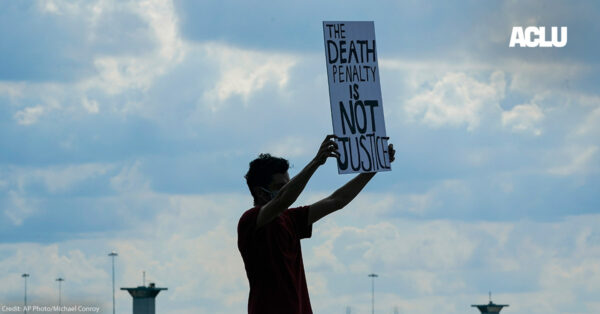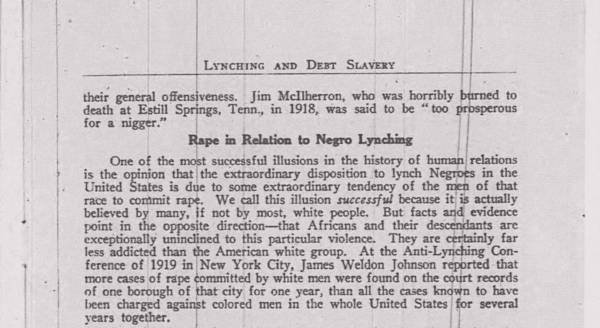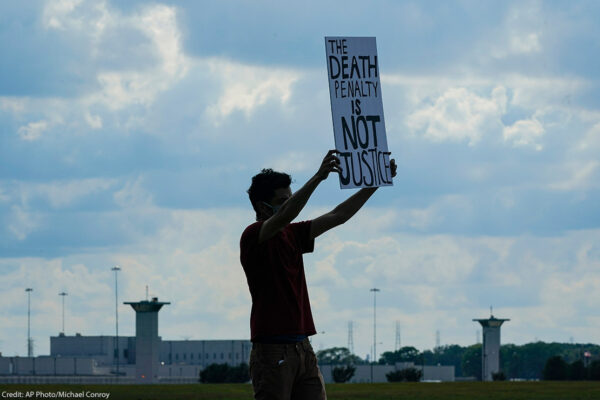Capital Punishment
Challenging Death Qualification and the Death Penalty in Kansas (Kansas v. Fielder)
Every person accused of a crime is entitled to a jury of their peers that represents a fair cross section of their community. But that is never the reality for Black and brown people facing the death penalty. A process called death qualification excludes people from capital juries if they do not believe in the death penalty. Death qualification rigs juries to be whiter and more likely to convict. It discriminates against Black prospective jurors, women, and people of individual faiths that oppose capital punishment.
Our fight against death qualification is just one piece of our upcoming challenge to Kansas’ use of the death penalty. The ACLU, together with the law firms Hogan Lovells and Ali & Lockwood, Democracy Forward, and the Kansas State Board of Indigents’ Defense Services’ Death Penalty Defense Unit is putting the death penalty on trial in Kansas in a series of hearings beginning in October.
Status: Ongoing
View Case
Learn About Capital Punishment
All Cases
58 Capital Punishment Cases

U.S. Supreme Court
Sep 2024
Capital Punishment
Tabler v. Lumpkin
In Tabler v. Lumpkin, the ACLU represents a Texas death row prisoner whose lawyers refused to represent him at a hearing to determine his capacity to decide whether to give up his state post-conviction appeals, leaving him effectively unrepresented at that hearing. Our petition asks the Supreme Court to review Richard Tabler’s case and to hold that when a defendant’s lawyers abandon him, his waiver of further appeals should not bar his access to federal habeas corpus review of the constitutionality of his conviction.
Explore case
U.S. Supreme Court
Sep 2024

Capital Punishment
Tabler v. Lumpkin
In Tabler v. Lumpkin, the ACLU represents a Texas death row prisoner whose lawyers refused to represent him at a hearing to determine his capacity to decide whether to give up his state post-conviction appeals, leaving him effectively unrepresented at that hearing. Our petition asks the Supreme Court to review Richard Tabler’s case and to hold that when a defendant’s lawyers abandon him, his waiver of further appeals should not bar his access to federal habeas corpus review of the constitutionality of his conviction.

Court Case
Aug 2024
Capital Punishment
Criminal Law Reform
Abdullahi Khalif Noor v. Melissa Andrewjeski
Abdullahi Khalif Noor is a Somali refugee, who was a cab driver living in Seattle when convicted of rape and assault, and sentenced to life imprisonment. He has always maintained his innocence. He challenged his convictions in Washington state courts, arguing that prosecutors had suppressed evidence of his innocence in violation of due process and Brady v. Maryland.
Unsuccessful in the Washington state courts, he filed a petition for a writ of habeas corpus in federal district court. He was again unsuccessful, and sought to appeal to the U.S. Court of Appeals for the Ninth Circuit. Ordinarily, when a party loses in federal district court they can immediately appeal the decision. But Mr. Noor was barred from doing so because he had not obtained a document Congress has required habeas petitioners receive from federal courts before they can appeal since 1908 — then called a certificate of probable cause, but now called a certificate of appealability (COA).
Explore case
Court Case
Aug 2024

Capital Punishment
Criminal Law Reform
Abdullahi Khalif Noor v. Melissa Andrewjeski
Abdullahi Khalif Noor is a Somali refugee, who was a cab driver living in Seattle when convicted of rape and assault, and sentenced to life imprisonment. He has always maintained his innocence. He challenged his convictions in Washington state courts, arguing that prosecutors had suppressed evidence of his innocence in violation of due process and Brady v. Maryland.
Unsuccessful in the Washington state courts, he filed a petition for a writ of habeas corpus in federal district court. He was again unsuccessful, and sought to appeal to the U.S. Court of Appeals for the Ninth Circuit. Ordinarily, when a party loses in federal district court they can immediately appeal the decision. But Mr. Noor was barred from doing so because he had not obtained a document Congress has required habeas petitioners receive from federal courts before they can appeal since 1908 — then called a certificate of probable cause, but now called a certificate of appealability (COA).

U.S. Supreme Court
Jul 2024
Capital Punishment
Galloway v. Mississippi
In Galloway v. Mississippi, the ACLU represents a man on Mississippi’s death row whose trial attorneys relied on a mere twenty-two-page presentation in support of a life sentence, without first conducting the background investigation that would have enabled them to make informed decisions about what evidence to present. A constitutionally adequate investigation would have uncovered voluminous mitigating evidence that could have caused the jury to decide for life instead of death. The Mississippi Supreme Court rejected Mr. Galloway’s claim by speculating that trial counsel had an alternative “strategy” that precluded their doing a full presentation of the abuse he suffered as a child and his mental disabilities—even though Mr. Galloway’s lawyers asserted no such strategic judgment.
Explore case
U.S. Supreme Court
Jul 2024

Capital Punishment
Galloway v. Mississippi
In Galloway v. Mississippi, the ACLU represents a man on Mississippi’s death row whose trial attorneys relied on a mere twenty-two-page presentation in support of a life sentence, without first conducting the background investigation that would have enabled them to make informed decisions about what evidence to present. A constitutionally adequate investigation would have uncovered voluminous mitigating evidence that could have caused the jury to decide for life instead of death. The Mississippi Supreme Court rejected Mr. Galloway’s claim by speculating that trial counsel had an alternative “strategy” that precluded their doing a full presentation of the abuse he suffered as a child and his mental disabilities—even though Mr. Galloway’s lawyers asserted no such strategic judgment.

U.S. Supreme Court
Apr 2024
Capital Punishment
Glossip v. Oklahoma
This long-running Oklahoma death-penalty case raises two issues:
1) Will the State of Oklahoma be permitted to execute Glossip, despite overwhelming evidence that he is innocent, and despite a confession by the State’s Attorney General that the state obtained his conviction by hiding crucial evidence impeaching its star witness?; and
2) Will the Court reaffirm its longstanding commitment to Due-Process-Clause precedent requiring the government to disclose favorable evidence in its possession to the accused and to correct false testimony introduced against the accused?
Explore case
U.S. Supreme Court
Apr 2024

Capital Punishment
Glossip v. Oklahoma
This long-running Oklahoma death-penalty case raises two issues:
1) Will the State of Oklahoma be permitted to execute Glossip, despite overwhelming evidence that he is innocent, and despite a confession by the State’s Attorney General that the state obtained his conviction by hiding crucial evidence impeaching its star witness?; and
2) Will the Court reaffirm its longstanding commitment to Due-Process-Clause precedent requiring the government to disclose favorable evidence in its possession to the accused and to correct false testimony introduced against the accused?
